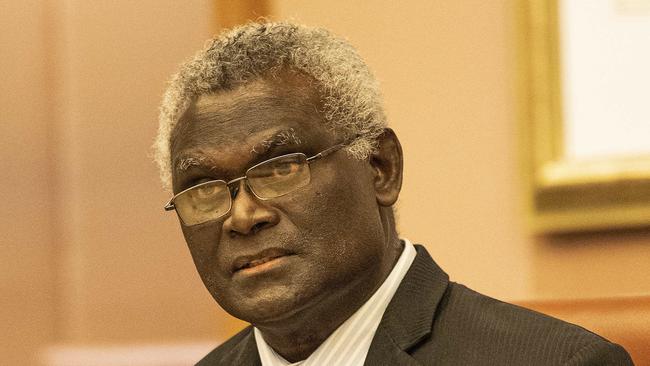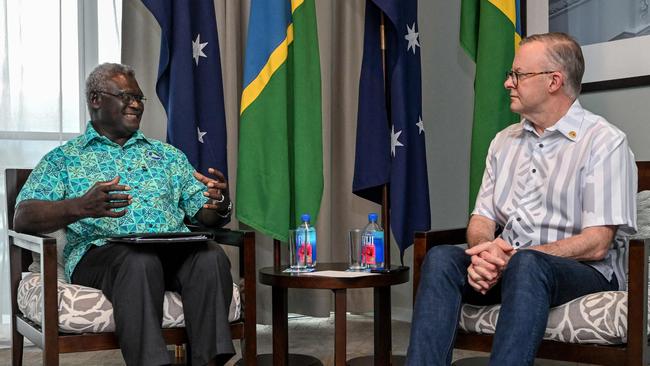Solomon Islands PM Manasseh Sogavare vows: ‘I’ll look to China’
Manasseh Sogavare has unveiled a policy platform that would deepen security and economic ties with China despite Australia’s efforts to strengthen ties.

Solomon Islands’ pro-Beijing leader has unveiled a re-election platform anchored by a “look north” strategy that would deepen security and economic ties with China despite Australia’s heightened efforts to strengthen ties with the Pacific nation.
Caretaker Prime Minister Manasseh Sogavare – leader of the Ownership, Unity and Responsibility Party and the country’s most dominant politician – on Tuesday revealed his party’s “five key policy priorities” if he is returned to power after the election on April 16.
Every one of them touched on opportunities he argues have been opened by his government’s controversial decision months after the 2019 election to switch ties from Taipei to Beijing.
They span a national broadband project being built with Huawei kit, closer alignment with China’s Belt and Road Initiative on “transformative infrastructure developments”, a police force strengthened with Chinese training, and closer security co-operation with Beijing.
“OUR Party will prioritise national defence and security and trade, while maintaining a pragmatic foreign policy stance,” Mr Sogavare’s political party said in a statement published on Tuesday.
“The party will strengthen (the) relationship with China through a ‘look north’ foreign policy, while nurturing ties with other traditional partners such as Australia,” the statement read.
The tone of the policy platform by the four-time Solomons prime minister – who in 2022 accused Canberra of making an “assault on our parliamentary democracy” – was conciliatory towards Australia. He stressed that his party was “friends to all and enemies to none”.
But the campaign document outlines the wide array of China-backed policies that will continue to cause Canberra unease if Mr Sogavare is returned after the April election, as is expected by many analysts.

“He fully intends to pursue closer ties to China,” Mihai Sora, a Pacific Islands expert at the Lowy Institute, told The Australian.
“And he’s very much left the door open for an increased Chinese presence in the security sector. Not just in policing, but potentially in national defence,” said Mr Sora, who was previously an Australian diplomat posted in Solomon Islands.
The campaign manifesto was released weeks after Beijing enticed Nauru to sever its ties with Taipei and as Australia’s recent security agreement with Tuvalu hangs in the balance following a recent election in the microstate.
Trade with China has grown since Honiara switched relations to Beijing in September 2019. China’s government has also funded infrastructure projects, such as a $120m stadium for the Pacific Games, which were held in the Solomons late last year.
The country is the third most populous country in the Pacific and also one of its poorest.
Since 2019, Mr Sogavare has tried to use his country’s growing relationship with China to nudge more assistance out of Canberra and other longstanding partners.
Domestic security in the archipelagic nation with a long history of violent protest and riots remains another top priority. Riots in 2021 led to some in the Solomons to call for Mr Sogavare to step down.
Beijing has told Canberra to stop worrying about the rising power’s influence in the region. “Pacific island countries are an area where China and Australia can co-operate and can contribute together instead of asking them to choose between the two,” China’s ambassador to Australia Xiao Qian said in January.
Canberra remains wary of Beijing’s intentions in its neighbouring region and is particularly worried about a possible military base. However, China’s huge economic pull limits Australia’s options.
“Australia’s in no position to try to keep China out, nor would that be welcomed broadly by Pacific communities or Pacific governments,” said Mr Sora.
“But it will work with other regional partners to strengthen the regional architecture and lock in things like a ‘Pacific family first’ approach to security contingencies to try to limit how far China can take that security access,” he added.




To join the conversation, please log in. Don't have an account? Register
Join the conversation, you are commenting as Logout